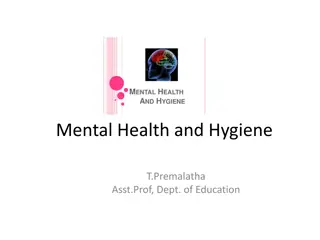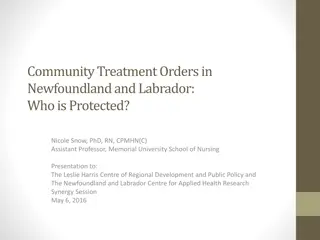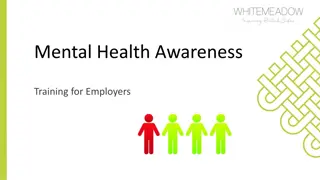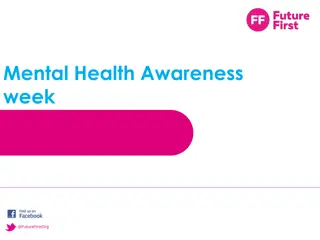
Understanding Mental Health in Public Health Context
Explore the intersection of public health and mental health, including the definition of good mental health, characteristics of a mentally healthy person, factors affecting mental health, warning signals, and more. Gain insights into mental health promotion, prevention of mental health illness, and mental health services.
Download Presentation

Please find below an Image/Link to download the presentation.
The content on the website is provided AS IS for your information and personal use only. It may not be sold, licensed, or shared on other websites without obtaining consent from the author. If you encounter any issues during the download, it is possible that the publisher has removed the file from their server.
You are allowed to download the files provided on this website for personal or commercial use, subject to the condition that they are used lawfully. All files are the property of their respective owners.
The content on the website is provided AS IS for your information and personal use only. It may not be sold, licensed, or shared on other websites without obtaining consent from the author.
E N D
Presentation Transcript
Public health and mental health By Dr Sabah M Abdelkader Assist Prof of Public Health
Objectives By the end of session, students will be able to: Explain connection of public health with mental health. Define good mental health correctly. Express understanding of characteristics of a mentally healthy person. Discuss factors affecting mental health. Recognize warning signals of poor mental health. Describe causes of mental ill health. Identify crucial points in human life cycle. Discuss prevention of mental health illness. Define mental health promotion. Recognize factors affecting mental health promotion. Describe mental health services.
Introduction Concept of mental health within a public health context is obvious. Everybody experiences psychological distress at some point but not everybody will experience such trauma to debilitating degree. An individual with a mental health problem is seen as unwell, psycho-pathogenic requiring treatment, care and adaptation. The individual will be required to change, to be less unwell and more functional. Mental health is a diverse and complex concept. Mental ill health affects around one in six individuals in UK. or as
Definitions Good mental health is defined as emotional and spiritual resilience which enables enjoyment of life and the ability disappointment and sadness Also a positive sense of wellbeing and underlying belief in our own and others dignity and worth. Mental health is not exclusively a matter of relation between persons, it is also a matter of relation of individual society, and social institution that guide his life, determine his way of living, working, leisure, and the way he earns and spends money. to survive pain, towards community,
Cont. Mental health is not a static condition but subject to variations and fluctuations. Mental health implies individual to form harmonious relations with others and participate constructively in changes in social and physical environment. Mental health implies his ability to achieve a harmonious and balanced satisfaction of his own potentially conflicting instinctive drives. the capacity of an
Characteristics of a mentally healthy person Mental health is not mere absence of mental illness. 1. Feels comfortable about himself, neither underestimate or overestimate his own ability. 2. Able to be interested in others and love them. He has lasting and satisfying friendships. 3. Able to meet demands of life, able to think and take decisions, sets reasonable goals for himself.
Factors affecting mental health Age: transitional related events affect many individuals e.g. adolescence, stressful events, biological degenerative conditions. Gender: women are more likely to suffer from depression. Migration: impacts negatively. Socio-economic background: correlation with more background. Occupation: doctors, nurses, teachers, farmers experience stress-related disorders. inverse privileged and less
Warning signals of poor mental health Are you always worried? Are you unable to concentrate due to unrecognized reasons? Are you always unhappy without justified causes? Do you lose your temper easily and often? Are you troubled by regular insomnia? Do you have wide fluctuations in your moods? Do you continually dislike to be with people? Are you upset if the routine of your life is disturbed? Do your children consistently get on your nerves? Are you afraid without real cause? Are you always right and others always wrong? Do you have many aches for which no doctors can find physical cause?
Causes of mental ill health Organic conditions: arteriosclerosis, epilepsy .etc. 2. Heredity: two schizophrenic parents are 40 times more likely to have a schizophrenic child. 3. Social pathological causes: worries, anxieties, emotional frustration, unhappy marriage, broken homes, poverty, changing family structure, rejection, economic insecurity, (together with genetic factors) 1. cerebral diseases, metabolic distress, tension, population mobility
4. Environmental factors: Toxic substances: mercury, lead. Psychotropic drugs: barbiturates, alcohol. Nutritional factors: deficiency. Minerals: iodine deficiency. Infective agents: measles, rubella. Traumatic factors: accidents. Radiation: nervous system is most sensitive to radiation during neural development. thiamine, pyridoxine
Crucial points in life cycle 1. Prenatal period: pregnancy is stressful for some women, they have physical and emotional needs. 2. First 5 years of life: roots of mental health. Studies confirmed disorders in broken homes. 3. School child: school practices may satisfy or frustrate emotional needs, affect his effectiveness in learning. behavioral
4. Adolescence: Stormy constitute dangers to mental health. 5. Old age: causes of mental illness are usually due to organic changes in insecurity, lack of homes. transition from adolescence to manhood the brain, economic
Prevention on community Primary: social environment and promotion of social emotional and physical well being of all people on individual basis: satisfying needs of man throughout his life for affection, belonging, independence, achievement, recognition and approval, sense of actualization. Mental Health promotion: Defined as the process by which an individual or community is assisted in achieving a positive sense of well being. basis, improving personal worth, self
Secondary: Early disturbance through screening programs in schools, universities, industry, recreation centers Provision of treatment through family based health services (family counseling). Tertiary: seeking to reduce duration of mental illness, thus reducing stress for family and community, to prevent further break-down and disruption. diagnosis of social and emotional
Factors affecting mental Health promotion Emotional processing. Self-management skills. Self-esteem. Environmental quality. Social alienation. Stress. Emotional negligence. Emotional abuse. Social participation. NB a deficit in one area may be offset by strength in another. Explain ???
Mental health services Early diagnosis and treatment. Rehabilitation. Group and individual psychotherapy. Mental health education. Modern psychoactive drugs. After-care services.
Comprehensive mental health program Since 95% of psychiatric cases can be treated with or without hospitalization close to their homes, current trend is full integration of psychiatric services. Community mental health program includes all community facilities: 1. Inpatient services. 2. Outpatient services. 3. Partial hospitalization. 4. Emergency services. 5. Diagnostic services. 6. Pre-care and after-care services. 7. Education. 8. training. 9. Research.
Thank Thank you you






















